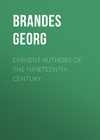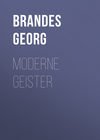Czytaj książkę: «Main Currents in Nineteenth Century Literature – 3. The Reaction in France», strona 4
II
HÖLDERLIN
Outside the group which represents the transition from the Hellenism of Goethe and Schiller to Romanticism stands a solitary figure, that of Hölderlin, one of the noblest and most refined intellects of the day. Although their contemporary, he was a pioneer of the German Romanticists, in much the same way as Andre Chenier, another Hellenist, was a pioneer of French Romanticism. He was educated with the future philosopher of the Romantic School, Schelling, and with Hegel, the great thinker, who came after Romanticism, and he was the friend of both of these, but had made acquaintance with none of the Romanticists proper when insanity put an end to his intellectual activity.
Hölderlin was born in 1770, and became insane in 1802. Hence, although he survived himself forty years, his life as an author is very little longer than Hardenberg's or Wackenroder's.
That enmity to Hellenism, which to posterity appears one of the chief characteristics of the Romantic movement, was not one of its original elements. On the contrary, with the exception of Tieck, who certainly had no appreciation of the Hellenic spirit, all the early Romanticists, but more especially the Schlegel brothers, Schleiermacher, and Schelling, were enthusiastic admirers of ancient Greece. It was their desire to enter into every feeling of humanity, and it was among the Greeks that they at first found humanity in all its fulness. They longed to break down the artificial social barriers of their time and escape to nature, and at first they found nature among the Greeks alone. To them the genuinely human was at the same time the genuinely Greek. Friedrich Schlegel, for example, embarks on his career with the hope of being for literature all that Winckelmann has been for art. In his essays "On Diotima" and "On the Study of Greek Poetry," he proclaims the superiority of Greek culture and Greek poetry to all other. There is an indication of the later Schlegel in the attempt made to combat the false modesty of modern times, and to prove that beauty is independent of moral laws, which in no way concern art. Characteristic also is his demonstration of Aristotle's lack of appreciation of the Greek Naturpoesie.
A similar but more enduring enthusiasm for ancient Greece was the very essence of Hölderlin's being; and this enthusiasm did not find its expression in studies and essays, but took lyric form, in prose as well as verse. Even as dramatist and novelist, Hölderlin was the gifted lyric poet, that and nothing else. Haym has aptly observed of his romances: "Joy in the ideal, the collapse of the ideal, and grief over that collapse, constitute the theme which the Letters of Hyperion develop with a force which never weakens and a fervour which is always alike intense… It is the irretrievable that is the cause of his suffering." And since the ideal was embodied for him in Greek life, such as he dreamed it to have been, his whole literary production is one longing lament over lost Hellas. Nothing could be less Greek or more Romantic than this longing; it is of exactly the same exaggerated character as Schack Staffeldt's enthusiasm for ancient Scandinavia and Wackenroder's devotion to German antiquity. Hölderlin's landscapes are as un-Greek as his modern Greeks in Hyperion, who are noble German enthusiasts, strongly influenced by Schiller. We cannot doubt that he was aware of this himself. But the lot of the solitary chosen spirits in Germany seemed to him a terrible one. Although he shows himself in his poems to be an ardent patriot, and although he sings the charms of romantic Heidelberg in antique strophes, yet Germany and Greece to him represent barbarism and culture. Concerning his own position to the Greeks he writes to his brother: "In spite of all my good-will, I too, in all that I do and think, merely stumble along in the track of these unique beings; and am often the more awkward and foolish in deed and word because, like the geese, I stand flat-footed in the water of modernity, impotently endeavouring to wing my flight upward towards the Greek heaven." And at the close of Hyperion he says of the Germans: "They have been barbarians from time immemorial, and industry, science, even religion itself, has only made them still more barbarous, incapable of every divine feeling, too utterly depraved to enjoy the happiness conferred by the Graces. With their extravagances and their pettinesses, they are insupportable to every rightly constituted mind, dead and discordant as the fragments of a broken vase." Of German poets and artists he writes, that they present a distressing spectacle. "They live in the world like strangers in their own house … they grow up full of love and life and hope, and twenty years later one sees them wandering about like shadows, silent and cold."
Therefore Hölderlin rejoices over the victories of the French, over the "gigantic strides of the Republic," scoffs at all "the petty trickeries of political and ecclesiastical Würtemberg and Germany and Europe," derides the "narrow-minded domesticity" of the Germans, and bewails their lack of any feeling of common honour and common property. "I cannot," he exclaims, "imagine a people more torn asunder than are the Germans. You see artisans, but not men, philosophers, but not men, priests, but not men, servants and masters, young and old, but not men."
The conception of the State which we find in Hyperion is also quite in harmony with the spirit of the age, and quite un-Hellenic. "The State dare not demand what it cannot take by force. But what love and intellect give cannot be taken by force. It must keep its hands off that, else we will take its laws and pillory them! Good God! They who would make the State a school of morals do not know what a crime they are committing. The State has always become a hell when man has tried to make it his heaven."
Utterly un-Greek, wholly Romantic, is the love which Hyperion cherishes for his Diotima. It is the same deep and tragic feeling which bound Hölderlin, the poor tutor, to the mother of his pupils, Frau Susette Gontard, and determined his fate. No Greek ever spoke of the woman he loved with the religious adoration which Hölderlin expresses for his "fair Grecian." "Dear friend, there is a being upon this earth in whom my spirit can and will repose for untold centuries, and then still feel how puerile, face to face with nature, all our thought and understanding is." And exactly the same Romantic, Petrarchian note is struck by Hyperion when he speaks of Diotima. Diotima is "the one thing desired by Hyperion's soul, the perfection which we imagine to exist beyond the stars." She is beauty itself, the incarnation of the ideal. Love is to him religion, and his religion is love of beauty. Beauty is the highest, the absolute ideal; it belongs, as a conception, to the world of reason, and as a symbol, to the world of imagination. From his æsthetic point of view, Hölderlin does not perceive that boundary line drawn by Kant between the domains of reason and imagination. His theory, a species of poetic – philosophic ecstasy, having points in common with both Schiller's Hellenism and Schelling's transcendental idealism, is Romantic before the days of Romanticism.
Germinating Romanticism is also to be traced in the gleam of Christian feeling which tinges his half-modern pantheism. He had been originally destined for the Church, and had suffered much from the severe discipline of the monastery where he was educated. In spite, however, of the many evidences of a pious disposition which we find in his letters, he was a pagan in his poems. He disliked priests, and steadily withstood his family's desire that he should become one. In his Empedokles we come upon the following significant reply of the hero to the priest Hermokrates: —
"Du weisst es ja, ich hab es dir bedeutet,
Ich kenne dich und deine schlimme Zunft.
Und lange Avar's ein Räthsel mir, wie euch
In ihrem Runde duldet die Natur.
Ach, als ich noch ein Knabe war, da mied
Euch Allverderber schon mein frommes Herz,
Das unbestechbar, innig liebend hing
An Sonn' und Aether und den Boten allen
Der grossen ferngeahndeten Natur;
Denn wohl hab ich's gefühlt in meiner Furcht,
Dass ihr des Herzens freie Götterliebe
Bereden möchtet zu gemeinem Dienst,
Und dass ich's treiben sollte so, wie ihr.
Hinweg! ich kann vor mir den Mann nicht sehn,
Der Göttliches wie ein Gewerbe treibt,
Sein Angesicht ist falsch und kalt und todt,
Wie seine Götter sind."7
There is not a trace in Hölderlin of the sanctimonious piety developed by the other Romanticists, who, to begin with, were far more decided free-thinkers than he. Yet his Hellenism is not pagan in the manner of Schiller's and Goethe's. There is a fervency in it which is akin to Christian devotion; his poetic prayers to the sun, the earth, and the air are those of a believer; and when, as in Empedokles, he handles a purely pagan subject, the spirit of the treatment is such that we feel (as we do in a later work, Kleist's Amphitryon) the Christian legend behind the heathen. The position of Empedokles to the Pharisees of his day and country is exactly that of Jesus to the Pharisees of Judea. Empedokles, like Jesus, is the great prophet, and both his willing sacrificial death and the worship of which he is the object awake feelings which remotely resemble those of the devout Christian.
In Hölderlin we find in outline, light and delicate as if traced by a spirit, symbols and emotions which the Romantic School develops, exaggerates, caricatures, or simply obliterates.
III
A. W. SCHLEGEL
In 1797, August Wilhelm Schlegel, then aged thirty, published the first volume of his translation of Shakespeare. Rough drafts of several of the plays in this edition have been found, and these faded, dusty manuscripts not only enable us to follow the persevering, talented translator in his self-imposed task, but, when carefully read, give us direct insight into his and his wife's spiritual life, and indeed into the intellectual life of the whole period.8
Even apparently insignificant details are suggestive. The manuscripts are not always in A. W. Schlegel's handwriting. He set to work upon Romeo and Juliet in the winter of 1795-96; in 1796 he married Caroline Böhmer; and we have a complete copy of the first rough draft of the play in Caroline's handwriting, with corrections in Schlegel's. In September 1797, as her letters show, she copied As You Like It from an almost illegible manuscript. And she was more than a mere copyist. She collaborated with Schlegel in his essay on Romeo and Juliet, which ranks next to Goethe's disquisitions on Hamlet in Wilhelm Meister as the best Shakespeare criticism produced in Germany up to that time. We recognise her now and again in some outburst of womanly feeling, or in a greater freedom of style than we are accustomed to in Schlegel. She had a far truer understanding than her contemporaries of the full significance of a work, the aim of which was the incorporation of Shakespeare in his unalloyed entirety into German literature. But her interest in the work and the labourer did not, as the manuscripts show us, survive the first year of her married life. At first it is her handwriting which predominates, and, though it is less frequently to be seen alongside of her husband's in the manuscripts of those plays with which he was occupied during the years 1797-98, her collaboration is still apparent. We find the last traces of her pen in the manuscript of the Merchant of Venice, which dates from the autumn of 1798. In October of that year, Schelling joined the Romanticist circle in Jena. Thenceforward no more of Caroline's handwriting is discoverable.
Among the manuscripts in question, two give us a very distinct idea of the progress of Schlegel's intellectual development. They are two different texts of the Midsummer Night's Dream.
Before A. W. Schlegel's time no one in Germany, or elsewhere, had attempted to translate Shakespeare line for line. The two tame prose translations by Wieland and Eschenburg were, in fact, all that existed. As a student in Göttingen, Schlegel made the first attempt to reproduce in German verse parts of the Midsummer Night's Dream. From childhood he had been "an indefatigable verse-maker." His talent was obviously inherited. Half a century before he and his brother made their appearance, two brothers Schlegel had made a name for themselves in literature – Johann Elias, who lived for many years in Copenhagen, was a friend of Holberg, and, in everything connected with the stage, a forerunner of Lessing, and Johann Adolph, father of August Wilhelm and Friedrich, who, without much originality, possessed decided linguistic and plastic talent.
As a young student, August Wilhelm, already distinguished by his impressionableness as a stylist and opinionativeness as an author, ardently desired to make the acquaintance of Bürger, who was leading a lonely and unhappy life as professor at the University of Göttingen. Bürger's fame as a poet procured him no consideration in a place where learning alone was valued; his social position had, moreover, been injured by the discovery of his relations with his wife's sister. With the feelings of an exile, he warmly welcomed the distinguished and talented young disciple, whose taste was more correct and whose stores of knowledge were better ordered than his own. At this time Bürger was still considered to be Germany's best lyric poet and most accomplished versifier. Schlegel placed himself under his tuition, and learned all his linguistic and metrical devices, all the methods of producing artistic effects by careful choice and arrangement of words and use of rhythm and metres. With his natural gift of imitation, he appropriated as many of Bürger's characteristics as were at all compatible with his entirely different temperament. His poem Ariadne might have been written by Bürger. Bürger had been particularly successful in the sonnet, a form of poetry which had lately come into vogue in Germany. So closely did the pupil follow in the footsteps of his master, that when, many years later, a complete edition of Schlegel's works was published, two of Bürger's sonnets were accidentally included among them.
The master did homage to his remarkably promising pupil in a fine sonnet, beginning: —
"Junger Aar, dein königlicher Flug
Wird den Druck der Wolken überwinden,
Wird die Bahn zum Sonnentempel finden,
Oder Phöbus' Wort in mir ist Lug,"9
and ending with the charmingly modest lines: —
"Dich zum Dienst des Sonnengotts zu krönen
Hielt ich nicht den eignen Kranz zu wert,
Doch – dir ist ein besserer beschert."10
Schlegel responded with a criticism of Bürger's frigidly grand Das hohe Lied von der Einzigen, which he praises as a magnificent epic. In collaboration with Bürger he now began a translation of the Midsummer Night's Dream, of which he did the greater part, Bürger merely revising. He was still completely under his master's influence; the manuscripts show that he always accepted Bürger's corrections and deferred to his predilection for sonority and vigour. As a translator, Bürger took no pains to reproduce Shakespeare's peculiarities as closely as possible; he only manifested his own peculiarities, by making all the coarse, wanton speeches, and the passages in which misguided passions run riot, as prominent as possible; he emphasised and exaggerated everything that appealed to his own liking for a coarse jest, and destroyed the magic of the light and tender passages. In spite of his own great and natural love of refinement, young Schlegel strove in this matter also to follow in his master's steps, with the result that he was not infrequently coarse and awkward where he meant to be natural and vigorous.
A better guide would have been Herder, who, long before this, in the fragments of Shakespeare plays in his Stimmen der Völker, had given an example of the right method of translating from English into German. If Schlegel had taken lessons from Herder in Shakespeare-translating, he would never have rendered five-footed iambics by Alexandrines, nor changed the metre of the fairy-songs. No one had realised the inadequacy of Wieland's translation more clearly than Herder. And now the spirit in which the latter aimed at Germanising Shakespeare descended upon Schlegel, who, in spite of the faults of his first attempts, soon surpassed Herder himself.
He was not long in shaking himself free from Bürger's influence. To Bürger the highest function of art was to be national and popular. In 1791, Schlegel, now no longer in Bürger's vicinity, but a tutor in Amsterdam, devoted much attention to the works of Schiller. His poetical attempts were henceforth more in the style of that master; he wrote a sympathetic criticism of Die Künstler; and he was led to a higher conception of art by the perusal of Schiller's æsthetic writings. His metrical style began to acquire greater dignity. But Schiller was almost as incapable as Bürger of developing in Schlegel a true and full understanding of Shakespeare – Schiller, who, in his translation of Macbeth, had transformed the witches into Greek Furies, and changed the Porter's coarsely jovial monologue into an edifying song. If Bürger's realism was one danger, Schiller's pomposity was another.
But at the same time that Schiller enlightened Schlegel as to the high significance of art, the newly-published Collected Works of Goethe, whom he only now began to appreciate, stimulated his natural inclination to study, interpret, and make poetical translations. As already mentioned, this first edition of Goethe's collected works met with but a poor reception. The chief reason of this was that the public, understanding nothing of the poet's mental development, had expected new works in the style of Werther or Götz. But to Schlegel's critical intellect, Goethe's wonderful many-sidedness was now revealed. He understood and appreciated the artist's capacity of forgetting himself for the moment, of surrendering himself entirely to the influence of his subject, which in Goethe's case produced forms that were never arbitrarily chosen, but invariably demanded by the theme. He understood that he himself, as a poetical translator, must practise the same self-abnegation and develop a similar capacity of intellectual re-creation. Two things were required of the translator, a feminine susceptibility to the subtlest characteristics of the foreign original, and masculine capacity to re-create with the impression of the whole in his mind; and both of these requirements were to be found in Goethe; for his nature was multiplicity, his name "Legion," his spirit Protean.
There still remained the technical, linguistic difficulties to overcome; and in this, above all, Goethe was an epoch-making model. He had remoulded the German language. In passing through his hands it had gained so greatly in pliability and compass, had acquired such wealth of expression both in the grand and the graceful style, that it offered Schlegel exactly the well-tuned instrument of which he stood in need. While under Bürger's influence he had looked upon technical perfection as a purely external quality, which could be acquired by indefatigable polishing; he now realised that perfect technique has an inward origin, that it is in reality the unity of style which is conditioned by the general cast of a mind. And he began to see that his life task was a double one, namely, to reproduce the masterpieces of foreign races in the German language, and to interpret critically for his countrymen the best literary productions both of Germany and other lands.
Now, too, Schlegel acquired a quite new understanding of Fichte, the friend and brother-in-arms whom the Romanticists had so quickly won for their cause. He realised that Fichte's doctrine of the Ego contained in extremely abstract terms the idea of the unlimited capacity of the human mind to find itself in everything and to find everything in itself. Round this powerful fundamental thought of Fichte's, August Wilhelm's pliable mind twined itself.
At this time he was much influenced by the correspondence which he kept up regularly with his younger brother. Friedrich had been drawn by August Wilhelm into the stream of the new literary movement, and his militant disposition made him the most reckless champion of the new principles as soon as he felt assured of their truth. The brothers had very different characters. The elder, in spite of the audacity of his literary views, had the better regulated mind. He had early developed a sense of form and of beauty. His chief gift was a capacity for moulding language; and accuracy, dexterity, and the sense of proportion were qualities he was born with. Except in cases of strong provocation, he showed moderation in scientific and artistic controversy; he knew comparatively early what he desired and what he was capable of; and his determination and perseverance made him a successful pioneer of the ideas and principles of which he had chosen to make himself the spokesman. He became the founder of the Romantic School, an achievement for which he possessed every qualification – this man whom his brother jestingly called "the divine schoolmaster" or "the schoolmaster of the universe."
Friedrich Schlegel was the more restless spirit, the genuine sect-founder. He himself tells us, in one of his letters, that it was his life-long desire "not only to preach and dispute like Luther, but also, like Mohammed, to subjugate the spiritual realms of the earth with the flaming sword of the word." He did not lack initiative, and abounded in plans so colossal that there was a jarring disproportion between them and his ability to carry them out. Eternally wavering, without tenacity or fundamental conviction, fragmentary in the extreme, but rich in both suggestive and disconcerting ideas and in witty conceits, he was constantly beset by the temptation to silence his opponents with mysterious terminology, and constantly liable to relapse into platitudes and meaningless verbiage. What Novalis once wrote to him was more correct than any one suspected: "The King of Thule, dear Schlegel, was your progenitor; you are related to ruin." As a critic, he was more impulsive and less impartial than August Wilhelm; as a poet, he was only once or twice in his life genuinely natural, and in his Alarkos he plunged into an abyss of bathos into which his brother, with his more correct taste, could never have fallen. The elder brother had started the younger in his literary career; the younger now drove the elder onward, and in the process put an end, by his unamiability, to the latter's friendly relations with Schiller, and, ultimately, even to his valued and long maintained friendship with Goethe.
August Wilhelm now put his translation of Shakespeare aside for a time, and turned his attention to the poets of the South. He experimented in all directions, translated fragments of Homer, of the Greek elegiac, lyric, dramatic, and idyllic poets, of almost all the Latin poets and many of the Italian, Spanish, and Portuguese. At a later period he even translated Indian poetry, his aim being to make the German language a Pantheon for the divine in every tongue. He lingered longest over Dante, although he did not possess the mastery of form required to render the terza rima; he rhymed only two lines of each triplet, thus altering the character of the verse and doing away with the intertwining of the stanzas.
After this he turned to Romeo and Juliet and Hamlet, sending fragments of his translations to Friedrich, who showed them to Caroline. Her judgment was favourable on the whole, but she found fault with the style as being rather antiquated; this she ascribed to Wilhelm's having been lately employed in translating Dante, his ear having thereby become accustomed to obsolete words and expressions. The fact was, that shortly before this he had awakened to the necessity of being on his guard against the elaborate polish which he had made his aim after giving up Bürger's style; he now fell into the other extreme, became archaic, rugged, and hard.
In 1797 Schlegel sent the first samples of Romeo and Juliet to Schiller. They were printed in Die Horen; and in the same periodical there presently also appeared his essay, Etwas über William Shakespeare bei Gelegenheit Wilhelm Meisters. In Wilhelm Meister Goethe had proclaimed the endeavour to understand Shakespeare to be an important element in German culture. In its conversations on Hamlet he had refuted the foolish theory that the great dramatist was an uncultivated natural genius, destitute of artistic consciousness. Had such been the case, the exact reproduction of his style would not have been a matter of vital importance in a German translation. But with so great an artist as the Shakespeare presented to us in Wilhelm Meister, it was plain that the harmony between subject and form must not be deranged. And yet even Goethe himself had, without any feeling of unsuitability, given his quotations from Hamlet in the old prose translation; even he had not realised how inseparably matter and manner are connected.
Slowly and laboriously Schlegel progresses. His judgment is still so defective that he fancies it impossible to dispense with Alexandrines; in Romeo and Juliet, he retains the five-footed iambics only "as far as possible"; the scene between Romeo and Friar Laurence he renders in Alexandrines, excusing himself with the remark that this metre is less detrimental in speeches garnished with maxims and descriptions than in the dialogue proper of the drama. The result is the loss of Romeo's lyric fervour.
He feels this himself, and with iron industry and determined enthusiasm sets to work again, rejects the Alexandrines, and compels himself, in spite of the verbosity of the German language, to say in ten or eleven syllables what he had said before in twelve or thirteen. For long it appears to him an impossible task to reproduce each line by one line. The translation swells in his hands as it did in Bürger's. Fourteen English lines become nineteen or twenty German. It seems to him that it is impossible to do with less; until at last he gains true insight, and sees, from the very foundation, how Shakespeare raises the edifice of his art. Now he renounces all amplitude and all redundancy that is not in Shakespeare. Each line is rendered by a single line. He curses and bewails the prolixity and inadequacy of German: his language has such different limits, such different turns of expression from the English language; he cannot reproduce Shakespeare's style; what he produces is a stammer, a stutter, without resonance or fire – but he coerces himself, he coerces the language, and produces his translation.
There is no great exaggeration in Scherer's dictum: "Schlegel's Shakespeare takes its place beside the works given to the world by Goethe and Schiller during the period when they worked in fellowship; there is the inevitable distance between reproductive and productive art, but there is the nearness of the perfect to the perfect."
Having acquired complete mastery of the style, Schlegel now began to reap the fruits of his labour. He, the master, opened his hand, and between the years 1797 and 1801 let fall from it into the lap of the German people sixteen of Shakespeare's dramas, which, in spite of occasional tameness or constraint of style, might, in their new form, have been the work of a German poet of Shakespeare's rank.
Let us consider what this really means. It means not much less than that Shakespeare, as well as Schiller and Goethe, saw the light in Germany in the middle of last century. He was born in England in 1564; he was born again, in his German translator, in 1767. Romeo and Juliet was published in London in 1597; it reappeared in Berlin as a new work in 1797.
When Shakespeare thus returned to life in Germany, he acted with full force upon a public which was in several ways more capable of understanding him than his original public, though it was spiritually less akin to him and though they were not the battles of its day which he fought. He now began to feed the millions who did not understand English with his spiritual bread. Not until now did Central and Northern Europe discover him. Not until now did the whole Germanic-Gothic world become his public.
But we have also seen how much went to the production of an apparently unpretending literary work of this high rank. In its rough drafts and manuscripts we may read great part of the intellectual history of a whole generation. Before it could come into existence nothing less was required than that Lessing's criticism and Wieland's and Eschenburg's attempts should prepare the soil, and that a genius like Herder should concentrate in himself all the receptivity and ingenuity of surmise belonging to the German mind, and should, with the imperiousness characteristic of him, oblige young Goethe to become his disciple. But Goethe in his prose Götz only imitated a prose Shakespeare. There had to be born a man with the unique talent of A. W. Schlegel, and he, with his hereditary linguistic and stylistic ability, had to be placed in a position to acquire the greatest technical perfection of the period. Then he had to free himself, by the influence of Schiller's noble conception of art, from the tendency to coarseness which was the result of Bürger's influence, and at the same time to steer clear of Schiller's tendency to pomposity and dislike of wanton joviality, had to gain a complete understanding of Goethe, to enter into possession, as it were, of the language which Goethe had developed, and to attain to an even clearer conviction than his of the essentiality of the harmony of subject and style in Shakespeare. It was necessary, too, that he should be stimulated by the ardour of a kindred talent and assisted by the keen criticism of a woman. Hundreds of sources had to flow into each other, hundreds of circumstances to coincide, of people to make each other's acquaintance, of minds to meet and fertilise each other, before this work, in its modest perfection, could be given to the world; a small thing, the translation of a poet who had been dead for two hundred years, it yet provided the most precious spiritual nourishment for millions, and exercised a deep and lasting influence on German poetry.
"'Tis nothing new; this I have told you oft;I know you well, you and your evil kind.And long it was a mystery to meHow Nature could endure you in her realm.Corrupters of mankind! Even as a child,My guileless heart shrank from you with distrust —That honest, fervent heart, that loved the sun,The cool fresh air, and all the messengersOf Nature, dimly discerned and great.For even then I timidly perceivedHow ye would take our true love of the godsAnd make it serve some baser, selfish end —And that in this ye would that I should follow you.Begone! I cannot look upon the manWho practises religion as a trade;His countenance is false and cold and dead,As are his gods."
[Закрыть]

















